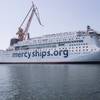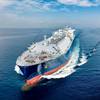With its shining reputation besmirched in recent years with a list of transgressions, from illegal dumping to sexual assault, the cruise industry has been under the legislative microscope.
The International Council of Cruise Lines (ICCL) works to ensure that its member lines are kept abreast on current issues dealing with topics related to the environment, safety and legislation, to name a few. In order to examine these issues to the core, MR/EN tapped the expertise of Ted Thompson, a retired U.S. Coast Guard captain, who now serves as ICCL's executive director.
The cruise industry because of its high profile is constantly under fire regarding various issues, whether they consist of illegal gray water dumping or alleged sexual assault, the industry which is known for pitching glorious relaxing vacation onboard floating meccas of paradise, is not exempt or coddled from environmental, safety and security issues plaguing the outside world.
Vacationers don't want to be traveling along on a ship and while enjoying their morning meal, be encountered with oily, dirty and/or polluted water. They also don't want to always be pondering if their valuables and themselves for that matter will be safe as they sleep in their staterooms. In order to ease these fears, as well as work to establish actions that will prevent further instances like these from occurring, the International Council of Cruise Lines (ICCL), based in Washington, D.C. has joined forces with several organizations to ensure that their member lines are effectively addressing these concerns.
According to Ted Thompson, the Council's executive vice president, the organization is working with federal, local and state agencies, such as the Department of Environmental Protection so that everyone has a good understanding regarding environmental protection, as well as the gray water issue. Thompson, assures that although gray water dumping, (which includes the discharge of waste from cabin sinks and showers), is a serious issue, it does not involve the cruise industry alone - but the maritime industry as a whole. Essentially this concerns 100,000 yachts and pleasure boats as well that are not immune to this issue.
Some of ICCL's member lines, namely Celebrity, Royal Caribbean, (who was fined a record $18 million for dumping oily bilge and chemical wastes at sea and into U.S. Ports), and Carnival, have already begun to implement technologically driven systems that are designed to properly treat gray water. Although, according to Thompson, one single system has not been designated for adaptation by the cruise lines, he added that by this time next year, enough systems will have been installed to allow the organization to determine which one is the most effective. "We are cooperating with all agencies to ensure that the proper actions are being taken," Thompson said.
In addition, ICCL issued a press release on March 7, 2000 regarding improved environmental records within the cruise industry. Issued by the General Accounting Office (GAO), the report was stated to Congress as "an acknowledgment of the high degree of compliance by the cruise industry with U.S. environmental regulations.
The GAO report titled, "Fewer Incidents by Cruise Ships Reported, But Important Issue Remain," states that from 1993-1998, the U.S. Coast Guard detected 2,395 illegal discharges from all non-U.S. vessels - 87 of which were from passenger ships. The report goes on to mention that "during that same time period, cruise companies significantly improved waste management and environmental procedures by streamlining waste handling and disposal practices." The report is referring to the recent courses of action that various ICCL member lines have adapted such as recycling, and using china and glassware instead of paper goods to help minimize excess waste.
While some may argue that pollution and waste management problems seem to rule within the cruise industry, in reality, only four percent of the world's pollution incidents occur on non-U.S. ships. ICCL also mentioned that if the GAO had looked at all vessels, the percentage would have been even lower.
Crime Reporting Procedures
The fact remains that a cruise vacation is probably one of the safest vacations available with their "gated community atmospheres." But crimes still do occur aboard these floating safe havens, and in order to ensure that the proper measures are taken to remedy any offenses that may occur, the U.S. Coast Guard and F.B.I. have jointly adapted what is called the Zero Tolerance Policy. This act, which requires cruise lines to report every crime allegedly committed onboard - whether that involves an instance of a passenger being sexually assaulted by a crewmember - to someone's camera being stolen out of their stateroom.
While this seems like a favorable course of action, and in some instances it may very well be, the question of "what defines crime onboard a cruise vessel," still looms overhead. Each cruise line may have a different perception of what crime is, and therefore each has adopted certain policies. In certain situations, according to Thompson, victims may sometimes not come forward and report an incident to the authorities, and then later on would change their minds and decide to prosecute. He assures that in every case, a crewmember would be fired - that is if he can be found. There have been instances where a passenger changed his/her mind to file a report months after the alleged incident occurred only to be notified that the alleged offender could not be located for prosecution.
Safety First
Aside from its active role in the development of various International Maritime Organization (IMO) safety initiatives, such as (SOLAS), Safety of Life at Sea; STCW (Standards of Training, Certification and Watchkeeping; MARPOL (Marine Prevention of Pollution from Ships); and International Safety Management Code (ISM), ICCL has worked with the USCG to ensure that all passengers onboard cruise vessels would be equipped with a life jacket.
Up until recently, life jackets for infants were not available. Classified by the Coast Guard as a child weighing between 18-25 lbs., these individuals were not able to use the conventional PFD's designed for adults and children, since their body structures differ. In a joint effort by ICCL and the Coast Guard, cruise lines are now required to have what are known as Infant Personal Floatation Devices (PFD's) for every baby onboard. Trained crewmembers will be able to assist parents in deploying the devices, which are available as a miniature life raft or the Cosalt-developed papoose style flotation device.
ICCL is also working to implement features on ships that will deem them more accessible for disabled people. Thompson noted that until about 10 years ago, the cruise industry did not recognize those with special needs, and are now taking the extra step to ensure that all new vessel will be constructed with these accessibility features. With a recommended report scheduled for presentation to an advisory committee on this matter in the near future, some ICCL member lines have already begun implementing these standards.
Subscribe for
Maritime Reporter E-News
Maritime Reporter E-News is the maritime industry's largest circulation and most authoritative ENews Service, delivered to your Email five times per week










